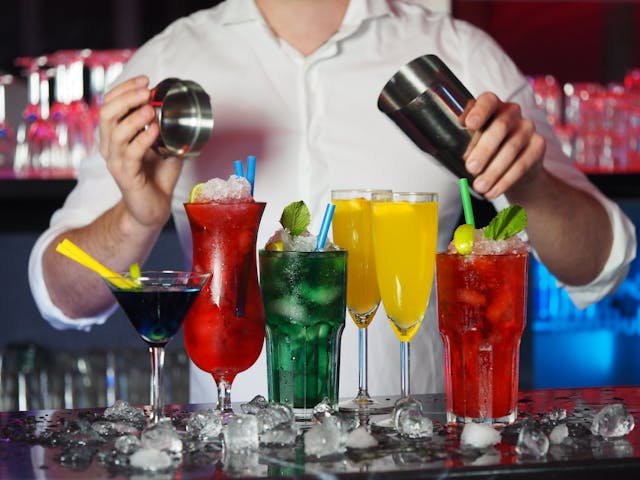Food Safety in the Catering Industry

Key points:
-
Food safety involves hygienic practices for preparing, handling, storing, and transporting food to prevent contamination.
-
It is crucial in catering to prevent biological hazards, reduce contamination risk, and maintain food nutrients.
-
Factors like unclean utensils, poor personal hygiene, and changes in food handling practices can compromise safety.
-
Essential safety rules include maintaining proper food temperatures, following the 2-hour rule for perishables, and separating raw foods.
Great catering businesses are usually known for great food. Every catering company in New York City that supplies food should have a food safety certification process in place.
Additionally, what makes great food goes beyond a satisfying and delicious taste. Especially because great food can be compromised in the absence of safety practices.
In the NYC catering industry, the body that generally regulates the safety practices that a caterer adopts in NYC is HACCP (Hazard Analysis Critical Control Point). This body sets down principles that help to reduce the risk of people getting sick from eating food.
Table of Contents
- What is HACCP?
- What is Food Safety?
- Why is safety important in Catering?
- Factors that affect Safety in Catering
- Food safety practices
- Safe catering: conclusions
What is HACCP?
“HACCP” is an acronym that stands for “Hazard Analysis Critical Control Point”. HACCP is a food safety management agency that identifies and implements measures to prevent food hazards.
What is Food Safety?
Food Safety is a term used to refer to hygienic routines put in place for the preparation, handling, storing, and transportation of food, to avoid contamination.
To ensure food safety, food hygiene cannot be displaced. With proper hygiene in place, food can hardly become contaminated and hazardous for human consumption.
From the farms to the trucks, and finally the forks of consumers, there are safety principles that should be applied strategically to avoid safety problems.
Why is safety important in Catering?
Food safety is important for several reasons; some of which are as follows:
Prevents hazards
It helps to uncover biological food hazards, and also avoid hazards through the use of preventive measures.
Minimal Contamination Risk
Practicing food safety reduces the risk of contamination, as food undergoes various processes to provide the best quality food.
Keeps Food Nutrients intact
Good safety maintains the nutritional value of food due to favorable storage conditions.
Adequate Preservation
It allows for proper preservation of food stock to subdue natural disasters like floods, tsunamis, and drought.
Factors that affect Safety in Catering
While some food services may pass the food safety practice test NYC requires, there are still several other factors that undermine it. Here are some of them:
Changes in food practice
Changes in how food is packaged, processed, and stored could lead to contamination by microorganisms.
Unclean utensils and hands
Dipping unwashed hands into food or picking them up compromises the safety of food and exposes it to contamination.
Lack of knowledge
In remote areas, safety problems are more prominent, due to limited knowledge.
Food safety practices
According to the FDA, there are practices essential to keeping food whole and safe for consumption. Thereby eliminating any kind of food hazard. Hence, it is important to learn which practices will help prevent biological hazards.
Keep raw foods squeaky clean
Keeping all raw foods clean is important to eliminate hazardous elements contracted from the environment or some physical touch.
Don’t compromise food Temperature
Keep hot food hot and cold food cold, to avoid the growth of microorganisms.
Maintain Personal hygiene
Wash hands properly for at least 16 seconds before touching food.
Separate raw foods
Always separate your raw foods, to avoid cross-contamination across foods.
Follow the 2-hour rule
The 2-hour rule should be followed strictly. Refrigerate perishable within 2 hours of exposure, and discard foods kept below the temp 40° F for more than 2 hours.
Safe catering: conclusions
According to WHO, about 420,000 die every year from the consumption of contaminated food. It should be no surprise that catering companies require food certification NYC needs to attest to practices in the catering industry.
On our blog, you can also find more information about the types of catering.
Frequenty Asked Questions
Check out the most frequently asked questions about food safety in catering!
What is HACCP and why is it important for catering businesses?
HACCP (Hazard Analysis Critical Control Point) is a food safety management system that helps catering businesses identify and control potential hazards in food preparation and handling. It ensures safe catering practices by preventing contamination and reducing risks of foodborne illnesses.
Do catering businesses in NYC need food safety certification?
Yes. Catering companies in NYC are expected to have proper food safety certification to demonstrate compliance with HACCP and FDA standards. Certification ensures that the business follows all required guidelines for safe catering, giving clients confidence in both the quality and safety of their food.
What are common factors that affect food safety in catering?
Some major factors include changes in food processing methods, poor hygiene, unclean utensils, lack of knowledge about safe practices, and improper storage temperatures. These issues can compromise safe catering and increase the risk of contamination.





